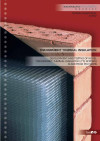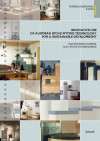Suchergebnisse für "Factsheet: Energietechnologien gestalten, die für alle sinnvoll und nutzbar sind"
IEA FBC Implementing Agreement Fluidized Bed Conversion (working period 2009 - 2013)
Overview of the current status of the fluidized bed technology worldwide in regards to energy technology.
Renovation with passive house technology by master-builder – verified planning documentation – Guide and seminars
The project aims at an increased implementation of passive house technology by the planning as well as the operating master-builder.
ChristophorusHouse(CHH)

Multifunctional building in passive house standard - The building was designed as innovative high-quality passive house (wood construction) with the latest ecological building automation as a pilot project which is multipliable in a reduced respectively altered form in Europe as well as overseas.
Practice Guide for Sustainable Building Sanitation and Modernisation within Construction Intents

A checklist considering priority, construction progress and actors is elaborated to serve a future-oriented selection of materials, energy carriers, design and construction within building sanitation, under a deliberate consideration of the involved actors from the construction branch
Contracting as a instrument for renovation

Development of contracting models for comprehensive renovation service packages.
New Standards for Old Houses. Sustainable Renovation Concepts for Houses on Estates Built Between the Wars and Post-War

The many housing estates of detached houses in Austria built in the times of economic crisis between the wars and post-war as part of publicly funded housing programmes are the starting point for this research project. The aim is to offer detailed guidelines with basic planning principles for the renovation of these housing estates with detached houses, aiming to reach the standard of a low-energy house or a passive house.
Knowledge based determination of plant species
Pollen for medical applications can be sorted by special machines. An integrated database and a spectrometric calibration allow a precise separation of the species with an identification of the plant species.
Energy Demand by Households and Household Characteristics
Analysis of private households' energy expenditures and interrelations between socio-economic characteristics and energy consumption
old house? old house!

The renovation and restructuring of existing housing stock using modern, ecologically efficient building technology as a means for developing Assisted Living Centres for senior citizens within an urban context
S I P settlement models in passive house quality
Research, development and realization of integral building concepts in passive house quality!
Transparent Thermal Insulation

Development and Testing of novel Transparent Thermal Insulatio (TTI) Systems made from Polymers
Forschungsforum
2/2002
Herausgeber: BMVIT
Englisch, 6 Seiten
Downloads zur Publikation
Energy Performance Contracting (IEA DSM Implementing Agreement - Task X)
The objective of this task within the IEA DSM programme is to facilitate the use of performance contracts and other energy service company (ESCO) contracts. In this scenario, the ESCO has taken on the project's performance risk by guaranteeing a specified level of energy savings. Its compensation for this risk is directly tied to achieving savings. The financing for such a project could come from the ESCO, the equipment supplier or a third-party company.
User-friendly heating and ventilation systems for low energy and passivehouses

The goal of the research project is the evaluation of different heating and ventilation systems for passive- and low energy multi family and office buildings taking into account indoor climate, possible variation of user behaviour, final and primary energy demand, costs, space demand and fail save installation and operation.
Smart Metering consumption
The project Smart Metering consumption focused on the energy consumption of the future smart metering infrastructure - an issue not widely discussed until now.
First passive-house school reconstruction

Factor 10 refurbishment of the General Secondary School II and Polytechnic School of Schwanenstadt (Upper Austria) with prefabricated wooden façade elements and with a comfort ventilation system.
Innovative Use Of Austrian Stove Fitting Technology For A Sustainabl Development

Tile stoves in Austria - Clay stoves in Zimbabwe
Forschungsforum
2/2000
Herausgeber: BMVIT
Englisch, 6 Seiten
Downloads zur Publikation
Existing building reconstruction and implementation of passive house components

Implementation of passive house components, systems and techniques into the practice of existing building reconstruction, in order to reduce the energy consumption as much as possible and to increase the living quality substantially. Craftspeople and planners, who are specialized in building renovation, should gain access to passive house know-how.
Use of thermal cooling technologies and optimal combination with other heat energy consumers to use during summer the available district heating based on renewable energy sources: example of the municipality of Mureck
Optimal use of heating energy from a biogas CHP in the municipality of Mureck through demand side measures; the multifunctional energy centre Mureck on the way towards thermal air-conditioning: Multi-Mukli
Sanierung PRO!

The goal of the project is the development of a guideline, which supports builders and planners or consultants in the organization and monitoring of inhabitant integration into the reorganization processes of multi-storey housing.
Optimization of energy supply

The purpose of the work is to analyze the possibilities of the reduction of the energy demand of residential buildings by using telecommunication technologies such as mobile phones or Internet. Lowering room and water temperature during the absence of the inhabitants are of particular relevance.
